English / Literacy
Intent
At the Queens’ Federation we aim to foster ‘Learning for Life.’
We will provide a rich, relevant and inspirational curriculum that promotes a lifelong love of learning and equips our pupils with the key knowledge and understanding, skills and personal qualities that they will need to thrive in a rapidly changing world. Our curriculum is designed to be relevant to our children and is linked to the context of our school and the local community.
Learning to read and write well are two of the most important skills that children develop in primary school. At the Queens’ Federation, the development of these crucial life skills is one of our highest priorities. It is our aim that all pupils will:
- read fluently, with enjoyment and good understanding
- write clearly, accurately and creatively, sharing their ideas with confidence
- speak confidently and listen to others carefully and with respect
Reading
The development of reading fluency, confidence and understanding is a key priority at the Queens’ Federation. It is our aim to foster a lifelong love of reading in all pupils and believe that reading is key for academic success. We aim to provide pupils with a literacy-rich environment, high quality texts and inspiring learning opportunities.
Phonics
Through daily, systematic and consistent high-quality phonics teaching, children learn to blend and segment words for reading and spelling. To allow our children to develop a strong phonic awareness and effective blending, decoding and comprehension skills, we use a DfE validated synthetic phonics programme called Success For All Phonics from FFT. The programme supports our intentions to teach children to read and write independently so that they are able to access a broad and exciting curriculum and flourish as learners throughout their time at our school.
Spelling and Writing
Pupils will be able to communicate their knowledge, ideas and thoughts through their writing. Our pupils will acquire a wide vocabulary, a solid understanding of grammar and will be able to spell new words by effectively applying the spelling patterns and rules they learn. Pupils will write clearly, accurately and coherently in a range of contexts and for different purposes and audiences. We intend to create writers who can re-read, edit and improve their own writing. Pupils will be encouraged to take pride in the presentation of their writing by developing a fluent and legible joined handwriting style by the time they enter KS2.
Speaking and Listening
We recognise how vital spoken language skills are for pupils and want to equip them with the tools they need to be heard, not just in school, but in their future career and life. The ability to speak eloquently, articulate ideas and thoughts, collaborate with peers and have the confidence to express your views are all vital life skills that support successful learning for life.
Implementation
Reading is a fundamental part of childhood and we aim to develop life-long readers. Pupils have the opportunity to read in school at different times of the day in a variety of different ways. Whole class guided reading sessions focus on the development of key reading skills – Vocabulary, Inference, Prediction, Explanation, Retrieval and Summarising (VIPERS). In addition to this, individual reading, whole class ‘Raving About Read’ sessions, reading buddy sessions and access to high quality texts across the curriculum all promote the development of reading. Attractive and inviting reading environments, including our school libraries, contain a wide range of books and reading materials suitable for all ages. Reading is also promoted through author visits and the celebration of reading events such as World Book Day.
High quality texts are used as starting points for each English unit of work. Through studying each text, pupils will learn about a specific genre or style of writing. They will be immersed in this type of writing, learning how to replicate features, exploring the writing structure and identifying purpose and audience. Lessons are planned using a three-phase cycle, closely linked to Pie Corbett’s Talk for Writing approach:
- Imitatin – the ability to learn a model text
- Innvation – the ability to adapt a well-known model text in order to create a new one
- Inventin – the ability to draw upon the full range of texts and life experience to create something new
Where possible, writing is given a real purpose and the pupils are provided with the opportunity to write from first-hand experience through the use of visits and visitors. The teaching of writing is often cross-curricular and links to our topics.
Pupils learn spellings at home and these are embedded in learning the following week in school. Spelling is taught daily in KS1, in Phonics or spelling lessons and weekly in KS2. Pupils who require additional support with spelling receive a variety of interventions that are tailored to address their individual needs.
Beginning in EYFS and continuing throughout KS1 and where necessary in KS2, pupils receive daily systematic teaching of synthetic phonics, following the progression set out in the DfE validated scheme Success For All Phonics from FFT. Early reading materials are closely linked to phonic knowledge. Once pupils can decode fluently, reading books are organised according to the national book-banding colour scheme. A number of different high-quality schemes are used throughout the school. Parents are provided with comprehensive guidance about how best to support the acquisition of phonic knowledge and all stages of reading at home. Pupils are supported and encouraged to read regularly both at home and at school.
The development of speaking and listening skills is integral to pupil progress in all areas of the curriculum. Planned experiences such as the use of talking partners, paired and collaborative activities, the giving and receiving of instructions, presentation of learning and drama activities all support our aim for pupils to become confident speakers and listeners. Skill development is enriched by opportunities for pupils to develop these key skills outside of the curriculum. Opportunities include assemblies, class assemblies, pupil leadership groups, pupil voice activities, extra-curricular and phase group productions.
Formative assessment takes place on a daily basis through observation of, in questioning and in conversation with pupils and in the production of written outcomes. Termly summative reading and writing assessments enable pupils to demonstrate their understanding of taught concepts. Both formative and summative assessments feed into the planning process ensuring that high quality teaching supports the needs of all pupils at all times. The Year 1 Phonics Check and end of key stage assessments measure school attainment against national outcomes.
Impact
By the end of their school experience, pupils at the Queens’ Federation will be confident, fluent readers who enjoy reading a wide range of reading materials. They will view reading as an essential life skill which enables them to unlock learning in all areas of the curriculum.
Pupils will also have developed the stamina and ability to write at the age expected standard. They will become fluent, independent writers who are able to express their thoughts and ideas through writing and will see themselves as authors. They will write clearly and accurately and be able to adapt their language and style of writing for a range of contexts, purposes and audiences.
By the time they leave the Queens’ Federation, pupils will be able to speak articulately with confidence and clarity. They will recognise the importance of listening in conjunction with speaking and will be confident in the value of their own opinions. Pupils will be able to adapt their use of language to suit a range of different purposes and audiences.
The achievement of these aims will ensure that pupils become confident readers, writers, speakers and listeners ready for the challenges of the next phase of their education and beyond.
Queen Emma Library
The librarians are working hard to keep both the downstairs and upstairs libraries neat and well organised. Keep up the good work!
Just outside the downstairs library, we are very lucky to have such a fantastic amount of space in which reading and writing are being celebrated. Comfortable reading areas have been created to make a welcoming space for children to read.
Downstairs Library
Our Key Stage 1 Library is looking fantastic! Colourful book boxes have been purchased to hold our ever-expanding collection of fiction books and we continue to purchase new books to increase our collection of all genres.
Upstairs Library
Thanks to a range of fundraising activities, new bookcases, beanbags and a wide range of fiction and non-fiction books have been purchased to further enhance this space. Thank you for your generous contributions.
Information for Parents
Supporting your child in English
One of the most important things that you can do to help your child succeed at school is to read to them and hear them read regularly. Sharing and discussing books together makes a huge contribution to a child’s language development, whether they are at the very early stages of learning to decode words in Reception, or reading more fluently in the older classes. Your child’s class teacher will be happy to talk to you about how you can support your child individually with their reading.
We have compiled lists of recommended books for children in Years 3 to 6. Please find these at the bottom of this page.
We have also produced No Nonsense Spelling Facts for Years 1 to 6.
Examples of Learning
Year 1 children enjoyed listening to the story entitled 'But Martin' and creating actions to retell it. We created story maps and carefully wrote our own versions using adjectives and the conjunction 'and'. We learned how to use purple pens to proofread. We also had fun sharing our stories with children from the other class!
Peer editing is a skill that year 6’s are becoming more comfortable. At the end of our writing unit, we practiced looking at other classmate’s writing, and being able to make changes that perhaps, they missed. Areas of focus included, spelling, punctuation, grammar, tenses, capitalisation, synonyms and cohesion. Well done – we will have another go later this year.
Year 2 and Year 5 had their first ‘Buddy Reading’ session this week. The Year 5 children listened to the Year 2 children read their books and then made comments in their reading records. It was a wonderful opportunity for the children to share their enthusiasm and thoughts on their reading books.
Year 2 enjoyed writing 'What am I?' riddles based on animals. We used expanded noun phrases and similes too! We created a class riddle book and we shared the riddles with our Year 5 reading buddies.
Children have enjoyed learning about fantasy stories and finding their features. The children used a clip called 'Once in a Lifetime' as their inspiration and then created their own characters. After writing their stories independently, they shared them with their Year 5 reading buddies.





.jpg)






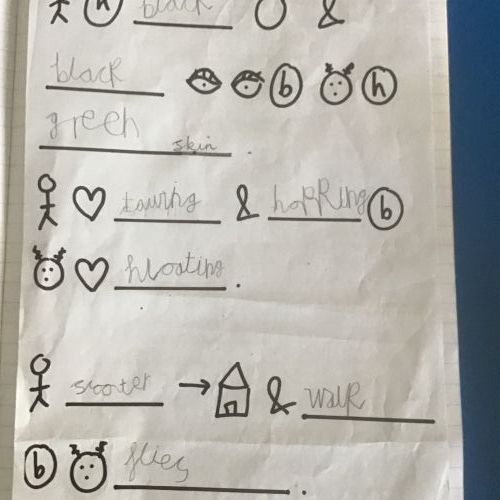

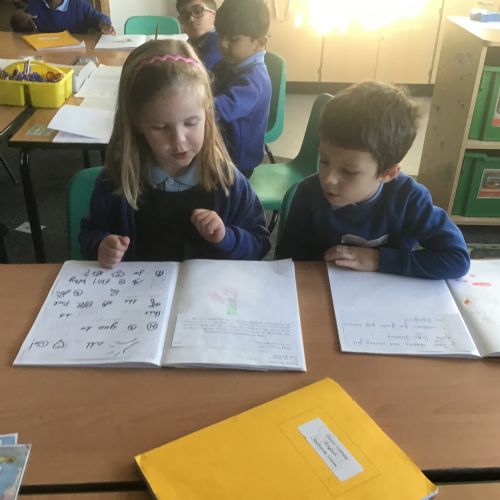
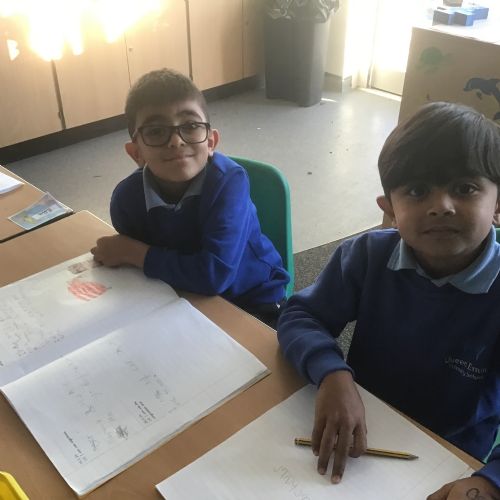
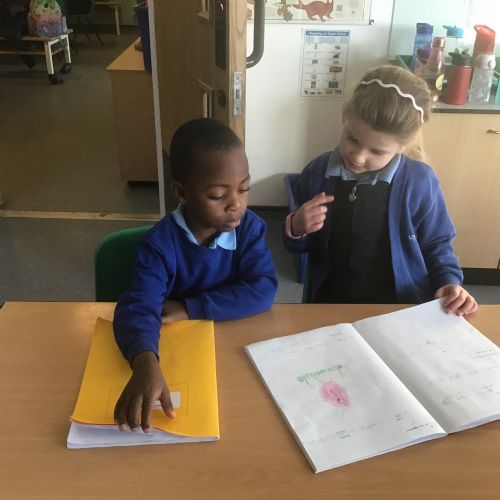
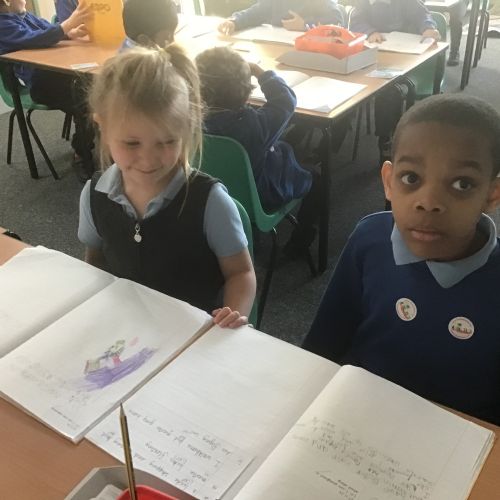
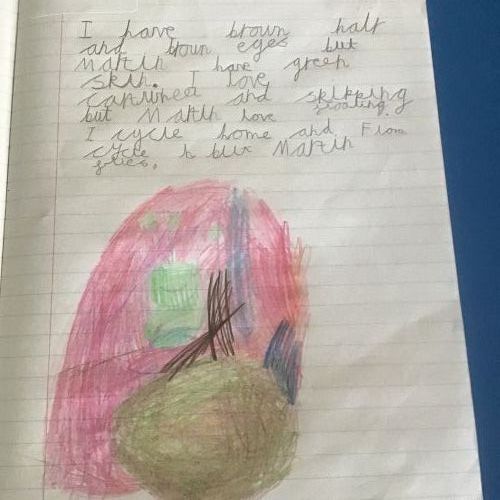
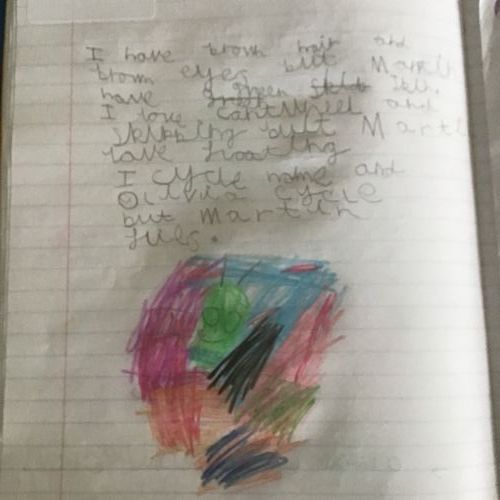
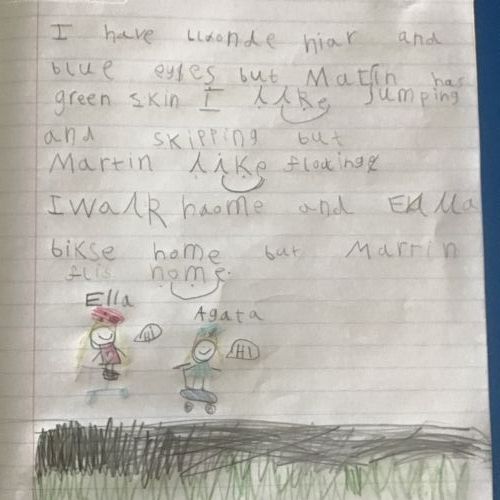
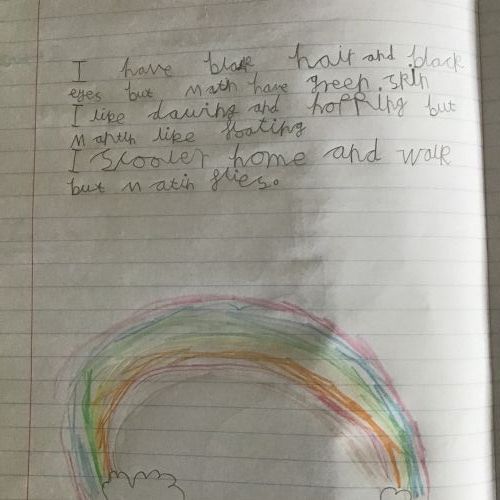
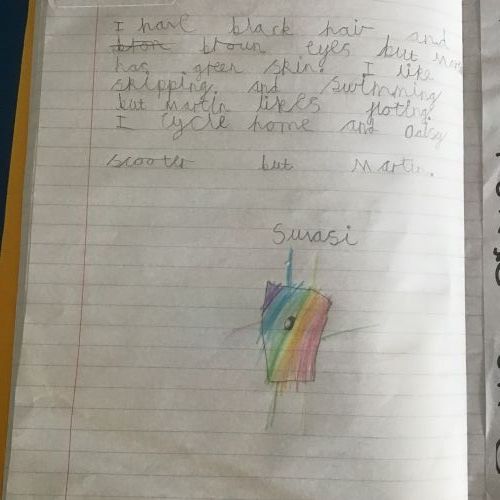
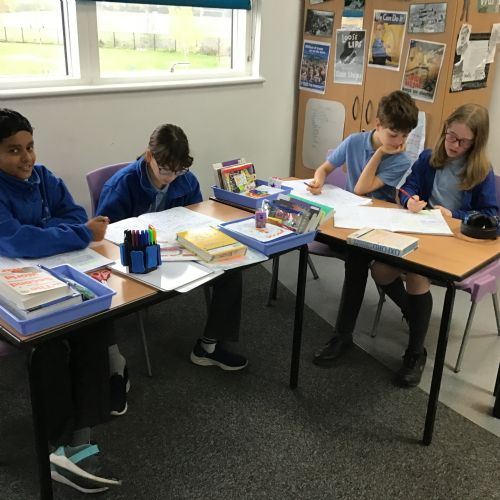
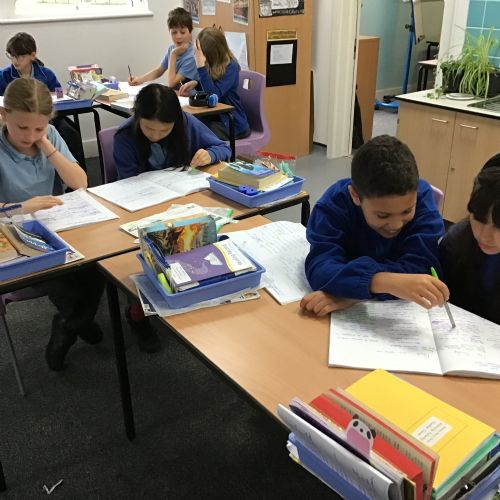
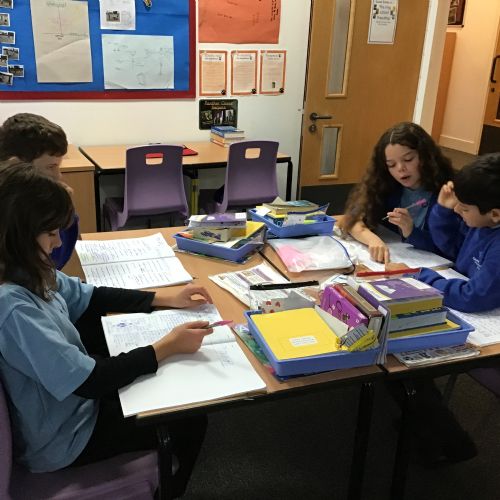
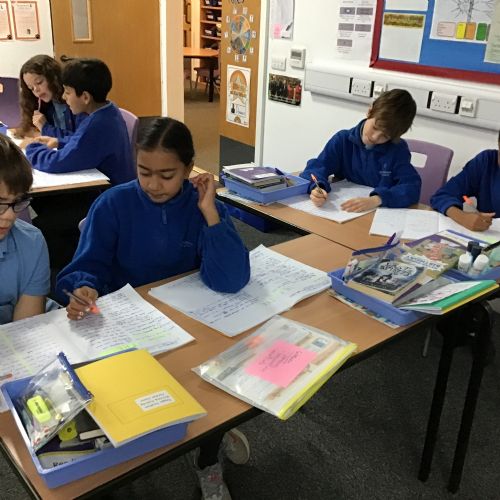
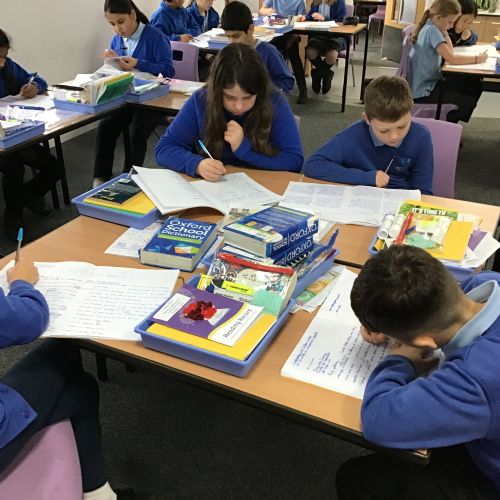
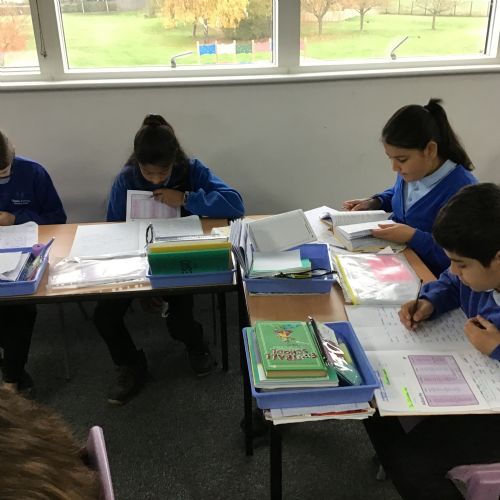
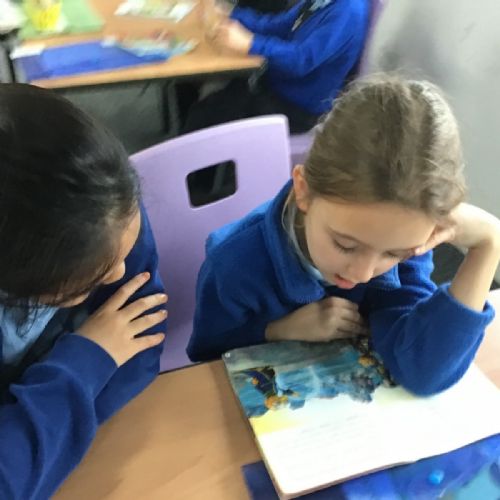
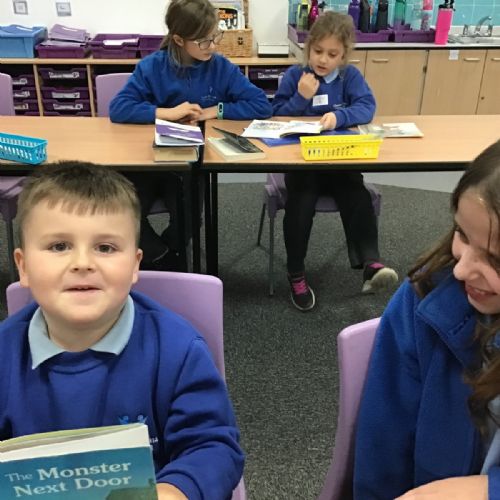
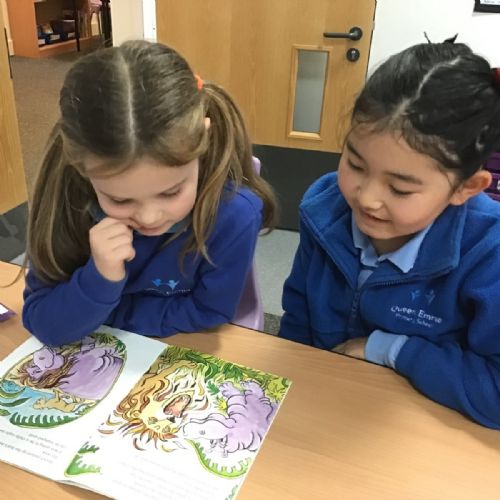
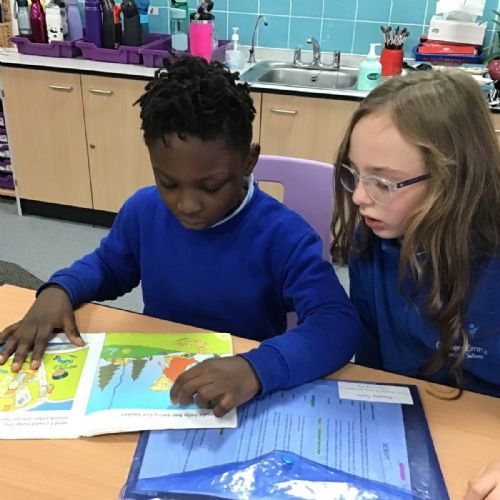
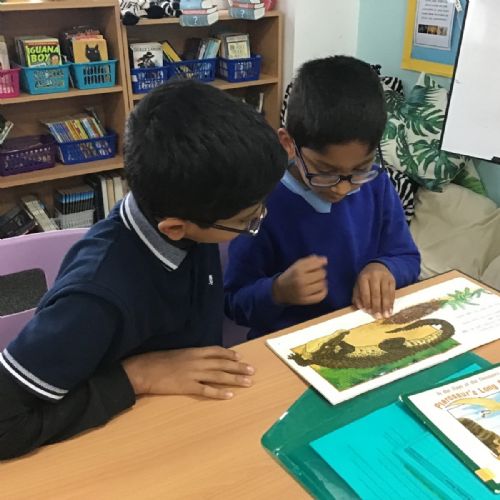
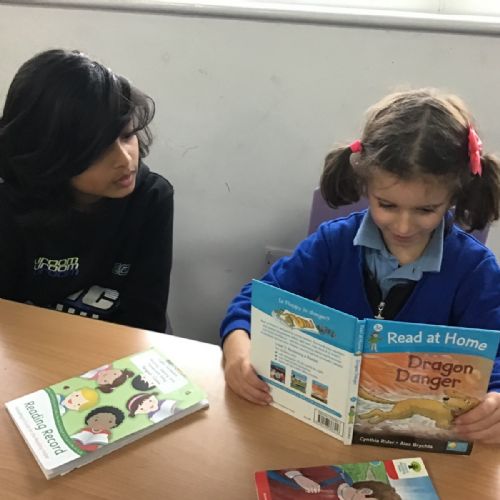
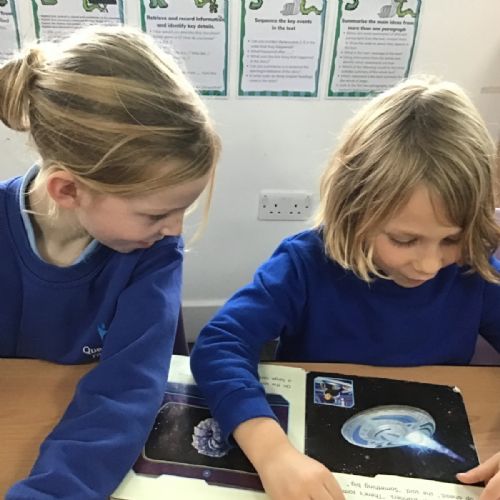
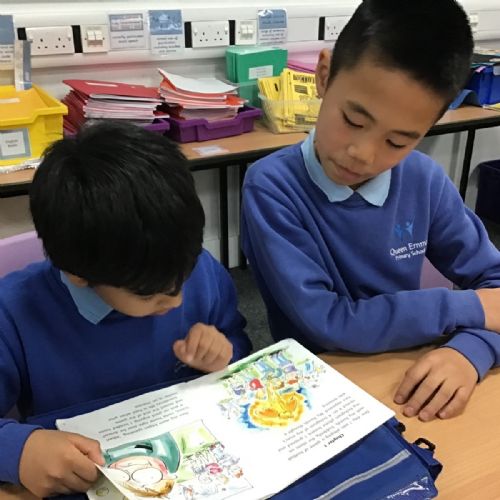
.jpg)




